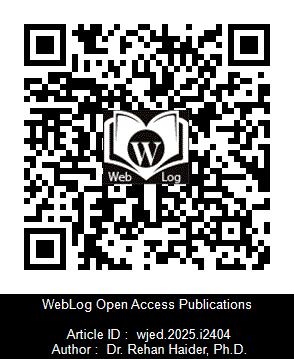
ARTICLE TYPE : RESEARCH ARTICLE
Published on : 24 Sep 2025, Volume - 1
Journal Title : WebLog Journal of Endocrinology and Diabetes | WebLog J Endocrinol Diabetes
Source URL: ![]() https://weblogoa.com/articles/wjed.2025.i2404
https://weblogoa.com/articles/wjed.2025.i2404
Permanent Identifier (DOI) :  https://doi.org/10.5281/zenodo.17442569
https://doi.org/10.5281/zenodo.17442569
The Therapeutic Applications of Brazilian Women's Breast Milk in the Management of Adult Type 2 Diabetes
2GD Pharmaceutical Inc., OPJS University, Rajasthan, India
3Assistant Professor, Department of Pathology, Dow University of Health Sciences (DUHS), Karachi, Pakistan
Abstract
Type 2 diabetes (T2D) is a growing global health concern, characterized by insulin resistance, chronic hyperglycemia, and a range of associated complications. Traditional treatment regimens have largely focused on lifestyle changes and pharmacological interventions, but the search for novel therapeutic agents continues. Recent studies have explored the unique bioactive components of breast milk, which possess immunomodulatory, anti-inflammatory, and metabolic properties. Among these, Brazilian women’s breast milk has shown promise due to its distinct composition influenced by genetic, dietary, and environmental factors.
This review investigates the potential therapeutic applications of Brazilian women’s breast milk in managing Type 2 diabetes in adults. Key bioactive components, such as lactoferrin, lactadherin, cytokines, and growth factors, may modulate insulin sensitivity, reduce inflammation, and improve glucose metabolism. In particular, lactoferrin has been linked to improved insulin resistance and enhanced pancreatic function, while other components may aid in reducing oxidative stress and systemic inflammation, both of which contribute to the pathophysiology of T2D.
Furthermore, the unique composition of Brazilian breast milk could offer a targeted, natural approach to complement existing treatments and provide a sustainable adjunct to current therapies. However, while the evidence is promising, clinical studies and controlled trials are needed to confirm the efficacy and safety of breast milk-based interventions for T2D management in adults. This paper outlines the potential mechanisms by which Brazilian women’s breast milk could become a valuable therapeutic tool in combating T2D, paving the way for future research in this innovative field.
Keywords: Brazilian Women’s Breast Milk; Type 2 Diabetes; Lactoferrin; Insulin
Citation
Haider R, Das GK, Ahmed Z. The Therapeutic Applications of Brazilian Women's Breast Milk in the Management of Adult Type 2 Diabetes. WebLog J Endocrinol Diabetes. wjed.2025.i2404. https://doi.org/10.5281/zenodo.17442569